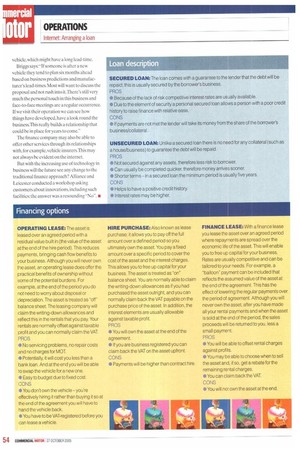l inancing options OPERATING LEASE: The asset is leased over an
Page 56

If you've noticed an error in this article please click here to report it so we can fix it.
agreed period with a residual value built in (the value of the asset at the end of the hire period). This reduces payments, bringing cash flow benefits to your business. Although you will never own the asset, an operating lease does offer the practical benefits of ownership without some of the potential burdens. For example, at the end of the period you do not need to worry about disposal or depreciation. The asset is treated as "off" balance sheet. The leasing company will claim the writing-down allowances and reflect this in the rentals that you pay. Your rentals are normally offset against taxable profit and you can normally claim the VAT. PROS • No servicing problems, no repair costs and no charges for MOT.
• Potentially, it will cost you less than a bank loan. And at the end you will be able to swap the vehicle for a new one.
• Easy to budget due to fixed cost. CONS • You don't own the vehicle — you're effectively hiring it rather than buying it so at the end of the agreement you will have to hand the vehicle back.
• You have to be VAT-registered before you can lease a vehicle. HIRE PURCHASE: Also known as lease purchase; it allows you to pay off the full amount over a defined period so you ultimately own the asset. You pay a fixed amount over a specific period to cover the cost of the asset and the interest charges. This allows you to free up capital for your business. The asset is treated as "on" balance sheet. You are normally able to claim the writing-down allowances as if you had purchased the asset outright, and you can normally claim back the VAT payable on the purchase price of the asset. In addition, the interest elements are usually allowable against taxable profit.
PROS • You will own the asset at the end of the agreement.
• If you are business registered you can claim back the VAT on the asset upfront. CONS • Payments will be higher than contract hire. FINANCE LEASE: With a finance lease you lease the asset over an agreed period where repayments are spread over the economic life of the asset. This will enable you to free up capital for your business. Rates are usually competitive and can be tailored to your needs. For example, a "balloon" payment can be included that reflects the assumed value of the asset at the end of the agreement. This has the effect of lowering the regular payments over the period of agreement. Although you will never own the asset, after you have made all your rental payments and when the asset is sold at the end of the period, the sales proceeds will be returned to you, less a small payment.
PROS • You will be able to offset rental charges against profits.
• You may be able to choose when to sell the asset and, if so, get a rebate for the remaining rental charges.
• You can claim back the VAT, CONS • You will not own the asset at the end.










































































































































































































